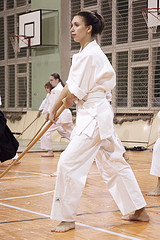When you decide that things aren’t quite right and that you have the power to make changes in the world, however large or small those changes might be, you leave the path. You can no longer follow the map of your youth, the instruction book your parents gave you, or mimic the decisions made by those around you. Breaking new ground is just that — you’re on your own.
If you’re lucky you’ll find like-minded people along the way and together you can chart this new territory, consult before making brave new choices of your own, or stumble along, helping each other pick up broken pieces from the mistakes that come from any learning experience.
Love and relationships are a site of potential change as gender roles and relationship power dynamics are being navigated and changed by more and more couples. Heteronormativity is no longer the only relationship model, but what’s an individual to do when they are conscious of historical imbalances and there is a desire to leave hegemonic power differentials behind, but yet there really isn’t a clear cut working model to follow?
Start with divorce. In North America right now anywhere from 1/3 to 1/2 of marriages end in divorce. So many people are divorced which means their fantasy picture of the happy nuclear family with white picket fence, etc. is not their lived reality. I’m divorced but most of the people I know who are divorced are close to my age. I don’t have a whole lot of elders to look to for help navigating the fallout of divorce (like co-parenting with someone when we’d rather never see or speak to each other again). It’s not possible to just walk away from that person forever, in a way that it once was. Where is my role model? Someone to tell me that “one day this will be ancient history and here’s what worked for me”?
And single parenting. Where are the supports for parents who are doing it on their own? Shouldn’t this be worked out by now? If so many families in Canada are managed by single parent head of household and most of the families headed by single mothers are living in poverty why hasn’t it been dealt with? We’re doing things differently than our parents’ generation and there is no one to drive the soccer team around, bring cupcakes to school, or even attend PTA meetings. Time for basic family maintenance and survival is precious. There are no extras.
Regarding fathers, many today are more than breadwinners. Divorced or not, how many of them are following their own father’s parenting style? The supports and guidance for these men are minimal and those that are around are underutilized. Whether for lack of time or anxiety/inexperience with the support structures that do exist, there are lots of dads who are winging it.
Next, more and more adult students are turning up in university classes. Many of the ones I’ve encountered are women post-divorce who hope post-secondary education will be a way out of poverty for themselves and their families. The supports for us, the roadmap for how to study and parent and juggle work (sometimes more than one job) has yet to be drawn.
People are redefining what a relationship entails. Sex in a culture of AIDS and STIs (on top of the fear of an unwanted pregnancy) has to be negotiated. Rape and sexual harrassment are real things that could happen to you and could come from the people around you. It really could (or really has) happened to you.
Dating can now include all kinds of technology: emails and text messages and messenger clients. Profiles on myspace, facebook, and other social sites can lead you to potentials as well as the older sites specifically for finding a match. Some people still think it’s wrong to look for a date through a matchmaker site, others wouldn’t dream of going out with someone until they’ve sussed out their language skills and interests via the distance and safety (perceived or real) of online communication. Each person has to navigate this themself; there is no consensus as of yet.
More re: dating: the question of who pays for what on a date is no longer such a big deal — for some people. There are still traditions in place about who drives, who opens doors, who sits first. For some couples, these things are reciprocated but for others old habits die hard. For those in the new water, it can feel good to know your relationship is on equal footing and that a gift of kindness is just that: a gift, given and accepted altruistically, not in order to create debt.
Couples use language to show they are part of this new movement: descriptors like “partner” and S.O.for a significant other show real effort to reflect how we feel about another person. Gender-neutral language is a big part of this. Calling someone your partner reflects that they are truly an equal: equally responsible, equally knowledgeable, equally capable for maintaining the relationship and all it entails. It shows that a couple is committed to working together and is helpful in preventing one part from blaming the other for any difficulties. You are partners.
It can also be a way to reject the traditional marriage model of husband who rules and wife who is chattel and obeys. Rewriting the language helps us to reflect the true nature of our relationships. The term partner is also useful for describing same sex relationships since there is no implied gender in the word. The term partner opens up minds as to what a relationship can be, in an attempt to breakdown heterosexist culture.
Language isn’t the only changing thing in relationships today. Choosing cohabitation or longterm dating with each partner maintaining their own residence are practical alternatives to marriage for a lot of couples. Having children or not are greater options as methods to control fertility and prevent pregnancy are further developed. If a couple does decide to marry for legal or religious reasons there are a greater number of choices for language used in a ceremony to reflect equality between the individuals and the diversity of couples marrying. It’s no longer assumed that a woman will change her name when marrying a man — many couples choose a hyphenated name for all or a hybrid name.
We are an individualistic society. We have a lot of choices to make and there aren’t a whole lot of examples to follow. We do the best we can, with the information we have at the time, but are we really making informed choices? Do we just rationalize when we make a choice that follows a tradition?
If we were truly lazy we wouldn’t do anything differently. Because we do endeavour to make changes, to reconstruct our families, our language, our ideologies we mustn’t t be lazy. Doing things differently takes effort, but it’s worth it: for us, our families, other people breaking ground along side us, and those who will follow.
 Comments(0)
Comments(0)





